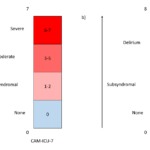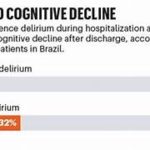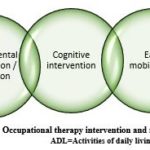NIDUS Blog
Discordance between ICDSC and CAM-ICU-7 as measures of delirium severity in the ICU
Karla D. Krewulak PhD and Kirsten M. Fiest PhD Department of Critical Care Medicine, University of Calgary, Calgary, AB, Canada Determination of delirium presence or absence may no longer be sufficient when tools exist to measure a delirium score which may be used to estimate delirium severity. Measurement of delirium severity has been identified as […]
Does Sleep Deprivation Cause Delirium? Exploring the Physiologic Links
Contributed by Shawniqua Williams Roberson, M.Eng., M.D., Departments of Neurology and Biomedical Engineering, Vanderbilt University Medical Center, Nashville, TN. Dr. Williams is a graduate of the 2019 NIDUS Bootcamp. Many of us are familiar with the feeling of not getting enough sleep. Perhaps a storm rattled the windows all night, or the baby couldn’t stop crying. […]
Delirium, Dementia, and Adverse Outcomes
Contributed by Thiago J. Avelino-Silva, MD, PhD*; Flávia B. Garcez, MD, PhD* *Faculty of Medicine, University of São Paulo, São Paulo, Brazil Delirium results from an intricate combination of dozens of possible predisposing and precipitating factors1. Older age, functional dependence, and preexisting cognitive impairment are key determinants for its occurrence, but the latter is a […]
Delirium Research Hub Spotlight – Colm Cunningham, PhD
Every few months, the Delirium Research Hub selects an investigator and research study included in the Delirium Research Hub to feature as a Spotlight Investigator. This month, we are featuring Dr. Colm Cunningham for his study “Brain Vulnerability, Inflammation, and Energy Metabolism in Animal Models”. His research focuses on the role of systemic inflammation on […]
Beyond delirium: The neuropsychiatric dimensions of COVID-19
Contributed by Mark Oldham, MD Assistant Professor – Department of Psychiatry, University of Rochester Medical Center, Rochester, NY The data are clear and, sadly, just as clearly predictable.1,2 COVID-19 has caused delirium—lots of it in fact. Twenty to 30% of older adults with COVID-19 develop delirium, with older adults at higher risk of delirium than […]
Occupational Therapy: Strategies for Delirium Management
Contributed by Evelyn Alvarez1,2,3 & Juan Pablo Saa4 1 Centro de Estudios en Neurociencia Humana y Neuropsicología, Facultad de Psicología, Universidad Diego Portales, Chile, 2 Facultad de Ciencias de la Salud, Universidad Central de Chile, Chile, 3 Departamento de Terapia Ocupacional y Ciencia de la Ocupación, Facultad de Medicina, Universidad de Chile, Chile, 4 Florey […]
Life Changing: Early Delirium Identification and Intervention
Contributed by Kimberly Oosterhouse, PhD, RN, CNE, Loyola University Chicago, NIDUS Pilot Grant Awardee “Kim, I think this is it; she is not responding to me. Can you please come and be with us?” These are the words I woke up to one morning 16 years ago. My distraught grandfather called me from the inpatient […]
Delirium Research Hub Spotlight – Miles Berger, MD, PhD
Every other month, the Delirium Research Hub selects an investigator and research study included in the Delirium Research Hub to feature as a Spotlight Investigator. This month, we are featuring Dr. Miles Berger, MD, PhD for his study “Markers of Alzheimer’s Disease and Cognitive Outcomes after Perioperative Care (MADCO-PC).” This study investigates whether changes in […]
Tags
Blog Topics
- Announcements & News (121)
- Delirium Research (82)
- AD/ADRD (10)
- Investigator of the Month & Spotlights (43)
- NIDUS Resources (8)
Citing a published NIDUS blog post on your CV
When citing a NIDUS blog post on your CV, list it in a section entitled ‘Other Non-Peer Reviewed Scholarship’. For the actual citation, list your name, blog title, organization (NIDUS), and the link to Blog. At the end, add ‘invited blog’ in brackets. This is the format suggested on the Harvard Med School CV template.
Example:
Sam Jones, My Delirium Blog Post, NIDUS, www.deliriumnetwork/my-delirium-blog-post.org (invited blog)







